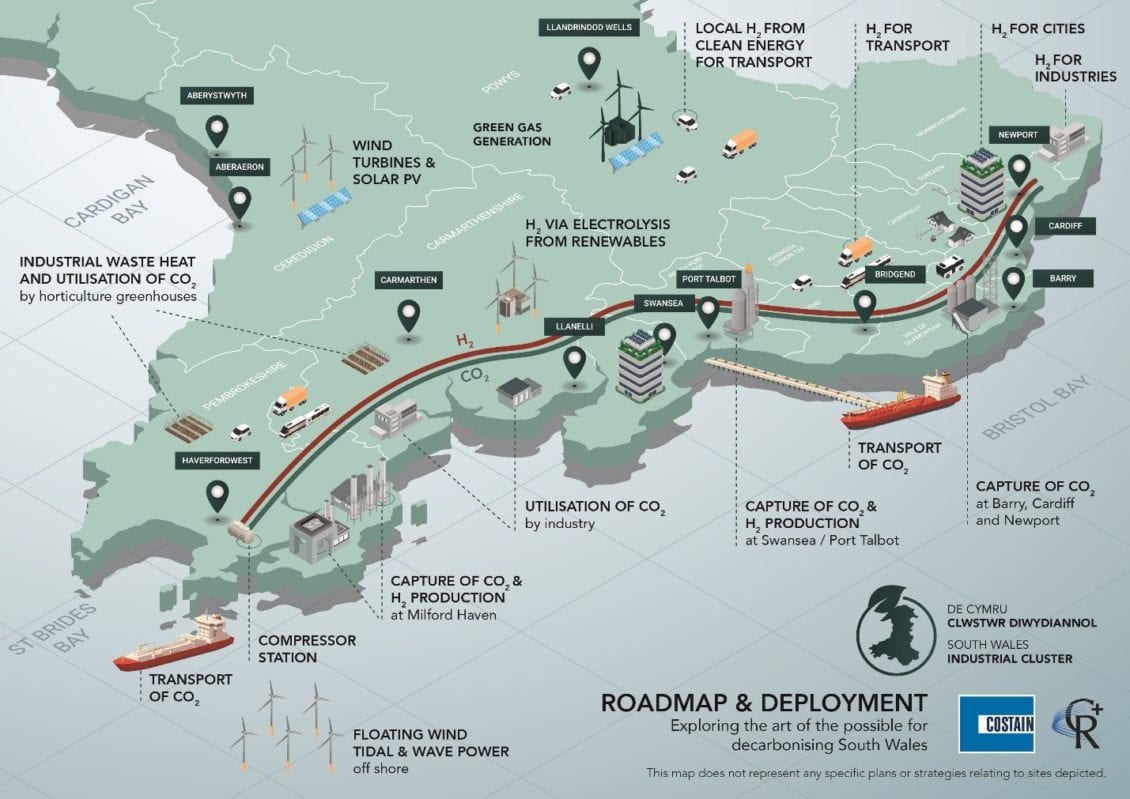The South Wales Industrial Cluster (SWIC), a partnership between Welsh industry, energy suppliers, infrastructure providers, academia, legal sector, service providers and public sector organisations, has been awarded £1.5million from UKRI’s Industrial Decarbonisation programme to map what is needed to support South Wales in becoming a net zero carbon region by 2050.
Wales has a long and rich industrial heritage, leading the way in the industrial revolution. Now it plans to be a leader of the green revolution.
South Wales is the second largest industrial emitter in the UK, releasing the equivalent of 16 million tonnes of carbon dioxide per year across industry and energy generation. In 2019, the UK became one of the first countries in the world to legislate that it will reach net zero carbon emissions by 2050. If the UK is to hit this target, we need new ways of heating homes, powering businesses and heavy industry and fuelling transport. This requires reducing emissions as far as possible using methods such as: energy efficiency, fuel switching and carbon capture utilisation and storage (CCUS); plus offsetting the residual carbon dioxide by other means, such as negative emissions technologies.
The project, led by CR Plus, and entitled “South Wales Industry – A Plan for Clean Growth” started in February 2021 and will last for 26 months and is funded via the Westminster Government’s UK Research and Innovation ‘Industrial Decarbonisation Challenge’. This will boost the competitiveness of key industrial regions and drive inward investment, creating and protecting jobs for a low-carbon global economy with growing low-carbon export markets.
The Industrial Decarbonisation Challenge will support delivery of the Clean Growth Grand Challenge and the Industrial Clusters Mission, which has set an ambition to establish the world’s first net zero carbon industrial cluster by 2040, with at least one low-carbon industrial cluster by 2030. The mission will help to place the UK at the forefront of the global shift to clean growth, by driving the technologies, services, and markets to produce low carbon industrial products.
The heart of the project is aimed at achieving net zero and at the same time, reversing the decline of heavy industry and creating economic prosperity for Wales. This will be done by developing a plan to preserve the existing 113,000 manufacturing jobs and potentially creating thousands of new skilled jobs by 2050. While this plan is dynamic and wide-reaching, the SWIC is appreciative that there is no “silver bullet” for decarbonisation of industry. SWIC will present numerous decarbonisation pathways to help ensure the wellbeing of future generations.
The partners, businesses and organisations stretching from Pembrokeshire in the west to Monmouthshire in the east, is being led by sustainability and energy engineering consultants CR Plus Limited. As the project lead it will work with the various sectors to develop holistic industrial site decarbonisation options and create a plan to help ensure South Wales industry as a whole achieves net zero by 2050.
Bryony Livesey, Challenge Director, Industrial Decarbonisation, UKRI said: “This second phase of the cluster plan competition asks companies and partners to plan for comprehensive changes to industries, products and supply lines. This is a crucial step in the government’s plans to develop cost-effective decarbonisation in industrial hubs that tackle the emissions challenge UK industry faces. The move to low carbon industry is a huge opportunity, and we look forward to supporting South Wales Industrial Cluster in becoming a net zero carbon region by 2050.”
Tony Parton, Managing Director of CR Plus, said: “The news that we have been successful in our bid, means our plans to scope out how we can successfully support decarbonisation of heavy industry, manufacturing and energy in South Wales can begin.”
“Our aim is ambitious, as is the will and determination of our partners. We want to create a solid and achievable plan to decarbonise industry through energy efficiency, fuel switching and the creation of local energy hubs. This will involve exploring many avenues, such as clean energy generation and distribution, as well as carbon capture utilisation and storage. In doing so, we hope our plan will help pave the way to secure heavy industry and manufacturing in Wales for decades to come and facilitate the decarbonisation of other sectors, such as domestic heating and transport.”
Dr Chris Williams, who is heading up SWIC for Industry Wales, said: “This is an aspirational vision-setting project, that will include the development of a step-by-step roadmap for the decarbonisation of our industries and the infrastructure required to achieve net zero. We have to say a huge thanks to CR Plus for leading the charge with this project, which will include the technical options but also the social and economic acceptability of what we are proposing.
“It’s a lot to take on, but what is clear is that doing nothing in South Wales is no longer an option, we have to be developing a net zero vision and plan. Our industries need to know that there is a plan being developed so that they can plan what they need to do individually. By not developing a South Wales plan we risk losing our industries to other areas that are. We therefore need to move to the forefront of decarbonisation activities and utilise the excellent universities that we have local to us.”
Dr Williams added: “We will also subsequently be looking at opportunities to create exciting new industries, as well as revitalising and sustaining existing. We have to use this project to pull together “net zero team Wales” to work with academia and government (local and national) to ensure we develop the best plan possible.”









Leave a Reply
View Comments